De Oostenrijkse schrijver Thomas Glavinic werd geboren op 2 april 1972 in Graz. Zie ook alle tags voor Thomas Glavinic op dit blog.
Uit: Das größere Wunder
»Entschuldige bitte.«
»Ach, verzieh dich.«
Jonas war jede Form von Beschimpfung oder Strafe lieber, als mit anzusehen, wie Mike gedemütigt wurde, wie er den Mund verzog und zu weinen begann. Jeder musste bemerken, dass Mike nicht verstand, was man von ihm wollte, aber seine Mutter bemerkte es nicht, sie nicht und ihre Freunde nicht, sie schimpften, sie schlugen zu, und Mike wehrte sich niemals.
Jonas, Mike und Werner waren am selben Tag zur Welt gekommen, ihre Mütter lernten sich im gemeinsamen Krankenzimmer kennen. Jonas und Werner besuchten denselben Kindergarten, saßen in der Grundschule nebeneinander, lernten auf demselben Fahrrad fahren und im selben Fluss schwimmen, verteidigten sich gegenseitig bei Prügeleien, passten gemeinsam auf Mike auf und entwickelten ähnliche Vorlieben und Abneigungen. Gemeinsam blockierten sie Garagen, probierten Apfelmost, fälschten Unterschriften für ihre Mitschüler, terrorisierten den Postboten, ruinierten Schlösser, warfen unangenehmen Zeitgenossen Flaschen durchs Fenster, in denen sie tausende Fliegen gezüchtet hatten, unterbrachen versehentlich die Stromversorgung des ganzen Ortes, retteten eine Hasenfamilie aus einer Tierheimhölle, und all das noch vor ihrem zehnten Lebensjahr.
Jonas wunderte sich oft, warum es nie Prügel für ihre Streiche setzte, egal, wie schlimm sie waren.
Werners Großvater hieß eigentlich Leopold Brunner, doch Verwandte und enge Freunde nannten ihn Picco, und Werner nannte ihn den Boss, wie er es in einem Film über einen Mann gehört hatte, der Picco angeblich ähnlich sah.
Jonas kam das erste Mal mit dem Boss in Berührung, als Werner in den Karateverein wollte, wo eine resolute Bäckermeisterin Kampfsport lehrte. Jonas hatte kein Geld dafür, weil sich seine Mutter in den wenigen wachen Stunden zwischen zwei Fuselräuschen weigerte, die Kursgebühren zu übernehmen. Werner redete mit Picco, und der bezahlte den Jahresbeitrag für beide. Da waren sie neun.“
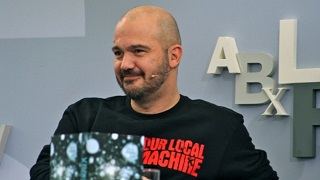
Thomas Glavinic (Graz, 2 april 1972)
De Amerikaanse schrijver, dichter en essayist Jay Parini werd geboren in Pittston op 2 april 1948. Zie ook alle tags voor Jay Parini op dit blog.
Swimming After Thoughts
In memory of Robert Penn Warren
Across the blackened pond and back again,
he’s swimming in an ether all his own;
lap after lap, he finds a groove
no champion of motion would approve,
since time and distance hardly cross his mind
except as something someone else might find
of interest. He swims and turns, eking
his way through frogspawn, lily pads, and shaking
reeds, a slow and lofty lolling stroke
that cunningly preserves what’s left to stoke
his engines further, like a steamwheel plunging
through its loop of light. He knows that lunging
only breaks the arc of his full reach.
He pulls the long, slow oar of speech,
addressing camber-backed and copper fish;
the minnows darken like near wishes,
flash and fade—ideas in a haze of hopes
ungathered into syntax, sounding tropes.
The waterbugs pluck circles round his ears
while, overhead, a black hawk veers
to reappraise his slithering neck, and frogs
take sides on what or who he is: a log
or lanky, milk-white beast. He goes on swimming,
trolling in the green-dark glistening
silence and subtending mud where things begin,
where thoughts amass in broken rings
and surface, break to light, the brokered sound
of lost beginnings: fished for, found.
The Discipline of Seeing
How can you begin to say what’s here?
In north New Hampshire woods turn rough
with jack pine, scrub oak, thistle;
granite edges flake in sunlight,
and the dirt is sandy, roots
like old hands swelling at the knuckles.
Air is white, and lakes are bluer:
pieces of old sky that fell to earth.
The wind seems far too high today
as white pines rustle at enormous height,
a lofty, lush, deep•throated whir;
its broad effects are all on view,
if only you can train the eye to watch,
to focus properly on what presents
itself in time, in taste and color,
shapes that shift from hill to valley
and demand continuous transcription.
It is always difficult to hold,
to place a moving landscape in the mind,
where language feeds upon the given world.
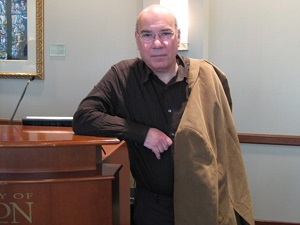
Jay Parini (Pittston, 2 april 1948)
De Nederlandse dichteres en schrijfster Anneke Claus werd geboren op 2 april 1979 in Doetinchem. Zie ook alle tags voor Anneke Claus op dit blog.
Het wohltemperierte klavier
We zaten met zijn allen aan de onberispelijk gedekte tafel, wij van de Tempelberg
en mijn nieuwe vriend Jan. Jan vond het machtig: bij hem thuis hadden ze niet
eens een tafel. Hij rinkelde nerveus met het bestek.
Je kon het zo gek niet verzinnen of het was volgens de spijswetten bereid. Ongedesemd
brood, halal paté, pastei, gelei, vijf koosjere salades, soep vooraf, kaas en
taart na. Jan kreeg blosjes op zijn wangen. Van louter verrukking dankte hij bijna
de verkeerde Lieve Heer. Niet met volle mond, zoveel nu ook weer niet.
Waarschijnlijk was het iets wat hij zei over het Biedermeierservies of de grootschalige
vleesindustrie. We lagen koud handjes vasthoudend in bed of het gevreesde
knarsen klonk van de la met de kwartierstaten, gevolgd door het wohltemperierte
Klavier.
Hoe wit de morgen. Hoe schoon uw koninkrijk. Een stille heilige Kristallnacht
verder riep moeder zonder haperen bijna al haar kinderen voor het ontbijt.
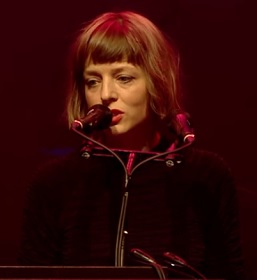
Anneke Claus (Doetinchem, 2 april 1979)
De Duitse dichter, schrijver en fotograaf Klaus Ender werd geboren op 2 april 1939 in Berlijn. Zie ook alle tags voor Klaus Ender op dit blog.
Lebensabend
Die Zeit fast abgelaufen,
’s gibt nicht mehr viel zu tun,
man kann sich Zeit nicht kaufen
und lässt die Stunden ruh’n.
Es neigen sich die Wipfel,
es neigt sich auch das Gras,
zu hoch sind alle Gipfel,
es bricht jetzt auch manch Glas.
Das jahrelange Streben,
es weicht der Phantasie
nach ganz erfülltem Leben
als Lebenssymphonie.
Als endlich wird empfunden,
was immer endlos war,
und viele alte Wunden,
sie heilen auf einmal.
Man sieht viel mehr gelassen
auf alles, was einst war,
man lernt es – zu erfassen,
ein Wunder war einst da.
Es war das Menschenleben,
das jedem ward geschenkt,
man nahm es so entgegen,
es war nur ein Geschenk.
Jetzt – wo die Jahresringe
ganz nahe am Vergeh’n,
da hofft man, es gelinge
ein schönes Wiedersehn.
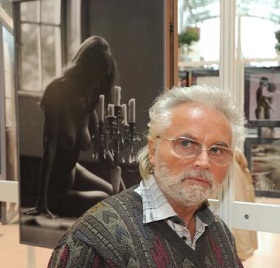
Klaus Ender (Berlijn, 2 april 1939)
De Amerikaanse dichter en letterkundige Ed Dorn werd geboren op 2 april 1929 in Villa Grove, Illinois. Zie ook alle tags voor Ed Dorn op dit blog.
Heart of Copper
The Candidate, answering a question
about El Salvador, generalized
by saying he thought
we should support human rights
everywhere they were being abrogated-
South Korea, South Africa
or South Yemen. He didn’t have
the moral perspicuity
to mention South Dakota.
Perhaps it’s too far north.
There’s only one natural death, and even that’s Bedcide For the post-mortem amusement of Richard Brautigan
A B H O R E N C E S
November 10, 1984
Death by over-seasoning: Herbicide
Death by annoyance: Pesticide
Death by suffocation: Carbon monoxide
Death by burning: Firecide
Death by falling: Cliffcide
Death by hiking: Trailcide
Death by camping: Campcide
Death by drowning: Rivercide
Lakecide
Oceancide
Death from puking: Curbcide
Death from boredom: Hearthcide
Death at the hands of the medical profession: Dockcide
Death from an overnight stay: Inncide
Death by suprise: Backcide
Death by blow to the head: Upcide
Death from delirious voting: Rightcide
Death from hounding: Leftcide
Death through war: Theircide & Ourcide
Death by penalty: Offcide
Death following a decision: Decide
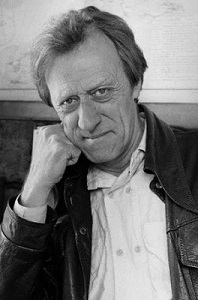
Ed Dorn (2 april 1929 – 10 december 1999)
De Duits-Nederlandse schrijver Konrad Merz werd geboren op 2 april 1908 in Berlijn als Kurt Lehmann. Zie ook alle tags voor Konrad Merz op dit blog.
Uit: Ein Mensch fällt aus Deutschland
„Auch die von Heini, der ja immer nur der Schatten des Stärksten ist. Ich beobachtete ihn. Jeden Atemzug des Redenden holte er nach, immer näher glitt er dem Magneten zu, jetzt war er schon nur noch Spiegelbild. Und so war auch er bereit. Aber nicht ich. Ich klappte ihnen ihre eigenen Worte auf und hielt sie ihnen vor die Nase: »Nennt mich krumm oder feige, es geht nicht um mich. Eben um das Gesetzliche geht es. Wir können es nicht erzwingen —nach 4 kommt 5 und nicht 7, auch wenn man es unendlich gerne will.« Manches holte ich wohl noch aus meinen äußersten Winkeln und den innersten. Meine letzten Worte waren etwa: »Ihr kommt mir vor wie ein Verein für Selbstentleibung. Arbeitet im kleinen! Zwölf Zwölftel machen auch ein Dutzend. Die Nacht muß sich vollenden, erst dann kann der Morgen kommen. Nur wer schreiten kann wie die Stunde, der kann schreiten.« Die Gesichter hatten sich weggedreht von mir. Meine Worte wurden in den Papierkorb geworfen. Man ging daran, durch Los den zu bestimmen, der schießen soll. Ein Mädchen war dabei. Ich merkte es erst jetzt. Sie hatte ein hartes, eckiges Gesicht, ihre Haare lagen starr wie bei einem Knaben. Sieben Menschen würfeln um den Tod. Der Achte würfelt nicht mit. Auf dem Tisch liegt eine Mütze. Daraus holt jeder seine Zahl und einer seinen Sarg. Wer dreimal die Sieben zieht — der ist bestimmt. Zuerst graben sie kalt ihre Zahl aus dem Schicksal. Heini! Ich bin so froh: er hat die Drei. Das Mädchen legt die Sieben auf ihre Handfläche. Völlig im Rausch, wirft sie ihre Finger auf den Tisch, darin vielleicht bald … und dann wirft sie ihre Haare nach hinten. Der zweite Gang. Pock hat eine Vier. Heini! eine Zwei. Nun wird es dich wenigstens nicht … Das Mädchen wirft sich Pock an die Brust, sie ist ganz von Sinnen. Sie hat wieder die Sieben. Du Mädchen? Mit dieser dünnen Hand? Und dann zog Heini die Sieben. Und die zweite Sieben. Und, Ilse! — er zog dreimal hintereinander die Sieben. Das Schicksal will ihn zermalmen.“

Konrad Merz (2 april 1908 – 3 december 1999)
Berlijn
De Franse schrijver Émile Zola werd geboren op 2 april 1840 te Parijs. Zie ook alle tags voor Émile Zola op dit blog.
Uit: La Confession de Claude
« Voici l’hiver: l’air, au matin, devient plus frais, et Paris met son manteau de brouillard. Voici la saison des soirées intimes. Les lèvres frileuses cherchent les baisers ; les amants, chassés des campagnes, se réfugient dans les mansardes, et, se pressant devant le foyer, jouissent, au bruit de la pluie, de leur printemps éternel. Moi, frères, je vis tristement : j’ai l’hiver sans printemps, sans amoureuse. Mon grenier, tout au haut d’un escalier humide, est grand et irrégulier ; les angles se perdent dans l’ombre, les murs, nus et obliques, font de la chambre une sorte de corridor qui s’allonge en forme de bière. De pauvres meubles, minces planches mal ajustées et peintes d’une horrible couleur rouge, craquent funèbrement dès qu’on les touche. Des lambeaux de damas déteint pendent au-dessus du lit, et la fenêtre, privée de rideaux, s’ouvre sur une grande muraille noire, éternellement debout et sévère. Le soir, quand le vent ébranle la porte et que les murs vacillent avec la flamme de ma lampe, je sens peser sur moi un ennui morne et glacé. Je m’arrête au foyer mourant, aux laides rosaces brunes du papier peint, aux vases de faïence où se sont fanées les dernières fleurs, et je crois entendre chaque chose se plaindre de solitude et de pauvreté. Cette plainte est navrante. La mansarde entière me réclame les rires, les richesses de ses soeurs. Le foyer demande de grands feux joyeux ; les vases, oubliant la neige, veulent des roses fraîches ; la couche soupire, me parlant de cheveux blonds et de blanches épaules. J’écoute, je ne puis que me désoler. Je n’ai pas de lustre à suspendre au plafond, pas de tapis pour cacher les dalles inégales et brisées. Et, lorsque ma chambre ne veut pour sourire que de belle toile blanche, des meubles simples et luisants, je me désole encore davantage de ne pouvoir la contenter. Alors elle me paraît plus déserte et plus misérable : le vent y pénètre plus froid, l’ombre y flotte plus épaisse ; la poussière s’amasse sur les planches, la tapisserie se déchire montrant le plâtre. Tout se tait : j’entends, dans le silence, les sanglots de mon coeur. Frères, vous souvenez-vous des jours où la vie était en songe pour nous ? Nous avions l’amitié, nous rêvions l’amour et la gloire. Vous souvenez-vous de ces tièdes soirées de Provence, lorsque, au lever des étoiles, nous allions nous asseoir dans le sillon fumant encore des ardeurs du soleil ? Le grillon chantait ; le souffle harmonieux des nuits d’été berçait notre causerie. Tous trois nous laissions nos lèvres dire ce que pensaient nos coeurs, et, naïvement, nous aimions des reines, nous nous couronnions de lauriers. »
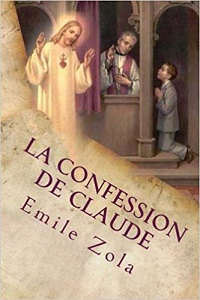
Émile Zola (2 april 1840 – 29 september 1902)
Cover
De joods-Hongaarse schrijver György Konrád werd geboren op 2 april 1933 in Berettyóújfalu (bij Debrecen). Zie ook alle tags voor György Konrád op dit blog.
Uit: A Guest in My Own Country
“We boys set out with empty knapsacks to see what we could find. We heard a machine gun ratatatatting from the direction of the Danube. There would be trouble if the Germans came back: the Dravidas would have us removed from Aunt Zsófi’s apartment and our feet would never again cross the copperplate but long IWC Portuguese Replica unpolished threshold.
A well-worn path led from the front gate of the school across the snow-covered courtyard to the back staircase and down into the cellar. We saw German corpses sticking out of the snow and shone our flashlight in their faces. I had always thought the dead grimaced, but every one of the faces was peaceful, including the one lying on his back on a wooden crate in the cellar next to a depleted bag of beans, his head hanging in a rather uncomfortable position. The only possible explanation was that there had been another crate under his head. And if they didn’t leave it there, it must have been worth taking.
We filled our knapsacks with beans, peas, wheat, and dried onions, which was all that remained by then, but were still interested in the crate lying under the young German. He was a tall, handsome young man with a powerful brow and a light-colored stubble on his narrow face. His deep-set large eyes were open, and he observed us with interest.
“Forgive us,” we said to him as we tried rolling him off the crate.
“I will not forgive you,” the soldier responded coolly. “I have no idea why I had to die on this crate after taking a bullet on the basement staircase and dragging myself over here. In fact, I have no idea what I am doing here. You will find this crate to contain fairly high-quality sausage, and though it has turned white on the outside with mold, after a bit of scraping you will find it perfectly edible. I have turned stiff, and you will take the crate out from under me and steal away with the goods, but I will remain here in the dark, in this cellar of death, until the corpse-removers take me to an even darker place. No, I will not forgive you.”
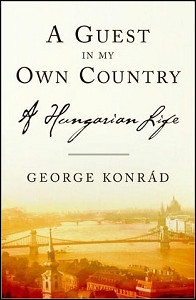
György Konrád (Berettyóújfalu, 2 april 1933))
Cover
De Amerikaanse dichteres Anne Waldman werd geboren op 2 april 1945 in Millville, New Jersey. Zie ook alle tags voor Anne Waldman op dit blog.
Scallop Song
I wore a garland of the briar that put me now in awe
I wore a garland of the brain that was whole
It commanded me, done babbling
And I no more blabbed, spare no lie
Tell womanhood she shake off pity
Tell the man to give up tumult for the while
To wonder at the sight of baby’s beauty
Ne let the monsters fray us with things that not be
From a high tower poem issuing
Everything run along in creation till I end the song
Ne none fit for so wild beasts
Ne none so joyous, ne none no give no lie
Tell old woes to leave off here:
I sing this into a scallop shell with face of a pearl
& leave all sorrow bye & bye.
HOLY 21st Century (Fragment)
Baghram holy? Guantánamo holy? Abu Ghraib unholy!
All hooded torture un-holy! All bodily sadistic harm un-holy!
All the hate un-holy! Big lies unholy! All the rape un-holy!
Unholy! Unholy! Unholy! Unholy! Unholy! Unholy!
Holy rap! Holy hip hop! Holy klezmer! Holy Afro-pop!
Holy jazz! Holy gamelan!
Holy pneumatic drills boring into the depths of Brooklyn!
Holy old slave graves!
False the military recruitment centers
Knocking on tenement doors get a fresh martyr for!
Holy Creeley! Holy Lucia Berlin! Holy Jackson MacLow!
Holy Brakhage! Holy Carl Rakosi! Holy Philip Lamantia!
Holy Steve Lacy, blowing his saxophone in heaven!
Cloning holy? Stem cells holy?
Amphetamine holy? Un-holy the polarized universe!
Holy the unfettered Universe!
Holy Negative Capability! Holy No Ideas But In Things!
Holy Projective Verse! Holy Modal Structures!
Banish grief & greed
o compassionate green-skinned savioress of the Mind
HOLY OM TARA HOLY TUTTH TARA HOLY TURE SOHA
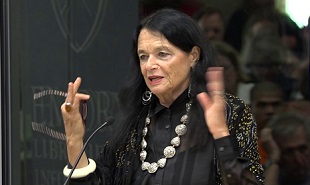
Anne Waldman (Millville, 2 april 1945)
Zie voor nog meer schrijvers van de 2e april ook mijn drie blogs van 2 april 2018.
